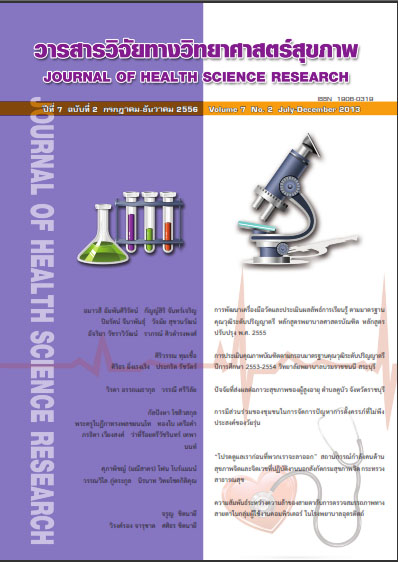“โปรดดูแลเราก่อนที่พวกเราจะลาออก” สถานการณ์ก�าลังคนด้านสุขภาพจิตและจิตเวชที่ปฏิบัติงานนอกสังกัดกรมสุขภาพจิตกระทรวงสาธารณสุข “Take Care of Us before We Resign” Situations of Mental Health Personnel Working outside the Department of Mental Health
Main Article Content
บทคัดย่อ
บทคัดย่อ
ปัญหาสุขภาพจิตมีแนวโน้มที่จะรุนแรงมากขึ้นใน
ขณะที่บุคลากรที่ปฏิบัติงานจริงมีแนวโน้มลดลง การให้การ
ดูแลสุขภาพจิตของประชาชนไม่ได้จ� ากัดอยู่เฉพาะหน่วยงาน
สังกัดกรมสุขภาพจิตเท่านั้น แต่กระจายไปอยู่ในสถานบริการ
สาธารณสุขทุกระดับ ซึ ่งข้อมูลการกระจายของบุคลากรตลอด
จนความต้องการของบุคลากรผู้ให้บริการด้านสุขภาพจิตกลุ่ม
นี้ยังไม่ได้มีการส�ารวจ ดังนั้นการวิจัยแบบภาคตัดขวาง ครั้งนี้
จึงมีวัตถุประสงค์เพื่อศึกษาสถานการณ์ก� าลังคนที่ปฏิบัติงาน
ด้านสุขภาพจิตและจิตเวช นอกสังกัดกรมสุขภาพจิต รวบรวม
ข้อมูลโดยใช้แบบสอบถามส่งทางไปรษณีย์ ประชากรคือ สถาน
บริการทั้งหมด จ�านวน 1,007 แห่ง โดยมีผู้ส่งแบบสอบถาม
กลับคืนจ� านวน 540 แห่ง (53.62%) และบุคลากรที ่ปฏิบัติงาน
ให้บริการในสถานบริการนั้นๆ จ�านวน 1,077 คน วิเคราะห์
ข้อมูลด้วยสถิติเชิงพรรณนา
ในด้านสถานบริการ 540 แห่งนั้น ส่วนใหญ่เป็น
โรงพยาบาลชุมชนในภาคตะวันออกเฉียงเหนือ ภาคกลางมี
จ� านวนบุคลากรมากที่สุดในสาขาจิตแพทย์ ผู้ช่วยพยาบาล
นักกายภาพบ� าบัด นักกิจกรรมบ� าบัด และผู้ช่วยเหลือคนไข้
ภาคเหนือมีบุคลากรสาขาแพทย์ทั่วไป พยาบาลเฉพาะทาง
พยาบาลที่จบปริญญาโทสาขาการพยาบาลสุขภาพจิตและ
จิตเวช นักจิตวิทยาคลินิก และนักสังคมสงเคราะห์
ในด้านบุคลากรมีผู้ตอบแบบสอบถาม จำนวน 1,077 คน
ส่วนใหญ่มีความพึงพอใจในงานทางด้านสุขภาพจิตและจิตเวช
อยู่ในระดับมาก มีความต้องการฝึกอบรมในเรื ่อง การดูแลช่วย
เหลือและฟื้นฟูด้านสุขภาพจิตและจิตเวช มีผู้ที ่มีความต้องการ
ย้ายหรือลาออกภายใน 5 ปีข้างหน้า จำนวน 289 คน (26.83%)
ในจำนวนนี้ส่วนใหญ่มีอายุระหว่าง 31-45 ปี (56.39%)
46-50 ปี (13.15%) และ 26-30 ปี (12.11%) โดยภาคกลาง
และภาคตะวันออกเฉียงเหนือมีแนวโน้มที่จะสูญเสียพยาบาล
วิชาชีพมาก จากผลการศึกษาพบว่า การคาดประมาณกำลัง
คนที ่จะสูญเสียของผู้บริหารหน่วยงานนั ้นๆ นับว่าเป็นการคาด
ประมาณที่ตำกว่าความเป็นจริง นอกจากนี้กลุ่มตัวอย่างยัง
รายงานถึงสิ่งสนับสนุนและปัญหาในการทำงานในด้านกำลัง
คน (man) ทรัพยากร (money & material) การบริหาร
จัดการ (management) และขวัญกำลังใจ (morale) ด้วย
While mental health problems have increased, the number of mental health care personnel is static
or even decreasing. Mental health care is needed in all levels of health care settings, including settings
outside the Thai Department of Mental Health. Little is known regarding the distribution, training and needs
of these mental health personnel. Therefore, a cross-sectional survey was conducted to investigate this
information. Self-administered questionnaires were posted to 1,007 administrators who were populations
in all settings under the Ministry of Public Health but outside the jurisdiction of the Thai DMH. 540
administrators (53.62%) responded and they distributed a second questionnaire for the staff in their
settings to fill in. There were 1,077 staff completed this second questionnaire and all the data were
analysed using descriptive statistics.
Of 540 settings, most were community hospitals in North-East Thailand. The central region had the
highest number of psychiatrists, nurse assistants, physical therapists, vocational therapists and nurse aids.
The North had the highest number of general doctors, nurse specialists, nurses with a master’s degree in
psychiatric and mental health nursing, clinical psychologists and social workers.
Of 1,077 staff, most had high job satisfaction and wanted to be trained in psychiatric and mental
health care and rehabilitation. The intention to leave within the next 5 years was found in 289 personnel
(26.83%) of all samples. Most of them (56.39%) were in the age of 31-45 years, followed by 46-50 years
(13.15%) and 26-30 years (12.11%). The estimated loss of staff as evaluated by the administrators of
those workplaces compared to the individuals themselves is a serious underestimate. There is a tendency
that the middle and north-eastern regions will lose registered nurses. Working outside the jurisdiction
of the DMH, individuals identified a variety of support and problems regarding man, money & material,
management and morale.
Downloads
Article Details
บทความที่ได้รับการตีพิมพ์เป็นลิขสิทธิ์ของวิทยาลัยพยาบาลบรมราชชนนี จังหวัดนนทบุรี
ข้อความที่ปรากฏในบทความแต่ละเรื่องในวารสารวิชาการเล่มนี้เป็นความคิดเห็นส่วนตัวของผู้เขียนแต่ละท่านไม่เกี่ยวข้องกับวิทยาลัยพยาบาลบรมราชชนนี จังหวัดนนทบุรี และคณาจารย์ท่านอื่น ในวิทยาลัยฯ แต่อย่างใด ความรับผิดชอบองค์ประกอบทั้งหมดของบทความแต่ละเรื่องเป็นของผู้เขียนแต่ละท่าน หากมีความผิดพลาดใด ๆ ผู้เขียนแต่ละท่านจะรับผิดชอบบทความของตนเองแต่ผู้เดียว


